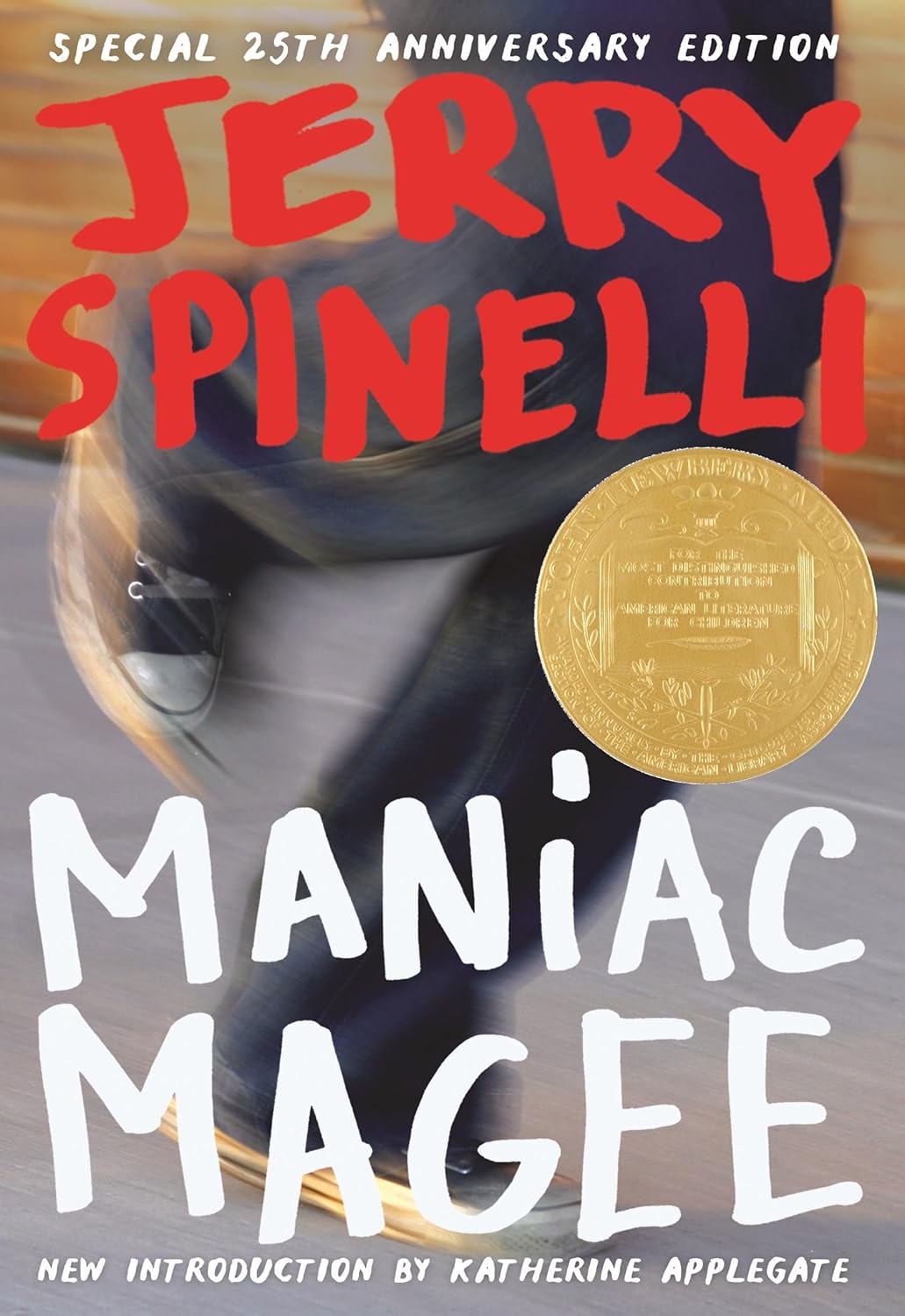
Maniac Magee
Chaper 26
by Spinelli, JerryIn Chapter 26 of *Maniac Magee*, the bond between Maniac and Grayson deepens through their shared love of baseball. As Grayson recounts stories from his past, Maniac instinctively reaches for baseball equipment, finding comfort in the tactile experience of handling a ball or mitt. Their casual storytelling evolves into active play, as they move outside to practice throws, pepper, and fielding. Grayson, despite his age, becomes a skilled instructor, teaching Maniac techniques like hitting to the opposite field and throwing a curveball. The baseball sessions become a conduit for their growing friendship, blending nostalgia with learning.
Grayson introduces Maniac to his signature “stopball,” a pitch he claims is nearly unhittable. Though Maniac suspects it’s mostly bluster, the pitch’s peculiar trajectory leaves him baffled, and he struggles to make contact. Grayson’s playful bravado adds humor to their practices, as he insists no one has ever hit the stopball. Despite Maniac’s skepticism, the pitch becomes a recurring challenge, symbolizing the blend of myth and skill in Grayson’s baseball lore. Their sessions extend beyond lunchtimes, spilling into evenings and weekends, with the autumn scenery framing their camaraderie.
The chapter takes a turn when Grayson discovers Maniac’s secret mornings spent at the library. Instead of buying snacks with the money Grayson gives him, Maniac purchases old, discarded books on a wide range of subjects. He eagerly shares his discoveries, demonstrating his self-taught knowledge, such as proving the properties of an isosceles triangle. Grayson, initially puzzled by Maniac’s eclectic book collection, becomes intrigued by the boy’s enthusiasm for learning. This revelation highlights Maniac’s intellectual curiosity and his desire to absorb knowledge from every available source.
The chapter concludes with Grayson, inspired by Maniac’s passion for learning, asking the boy to teach him how to read. This moment marks a significant shift in their relationship, as Grayson, who once served as Maniac’s mentor in baseball, now becomes his student. The mutual exchange of skills—baseball for literacy—underscores the transformative power of their friendship. Their dynamic evolves from playful camaraderie to a deeper, reciprocal bond, setting the stage for further growth and connection in the story.
FAQs
1. How does the act of handling baseball equipment enhance Maniac’s experience of listening to Grayson’s stories?
Answer:
The tactile experience of handling baseball equipment—sniffing the horsehide aroma of the ball, feeling the red stitching, or gripping a bat—deepens Maniac’s connection to Grayson’s stories. While the text notes it’s hard to explain why this makes listening better, these sensory details likely evoke nostalgia and immersion, making the tales feel more vivid and personal. This ritual reflects baseball’s cultural significance, where physical objects carry emotional weight and memory, transforming passive listening into an interactive, almost participatory experience.2. What is the significance of Grayson’s “stopball,” and how does it illustrate the dynamic between him and Maniac?
Answer:
The stopball symbolizes Grayson’s blend of playful storytelling and mentorship. Though Grayson claims it’s a magical pitch that stops mid-air, Maniac suspects it’s blarney—yet the pitch still baffles him, mixing psychological trickery with skill. This reflects their relationship: Grayson shares wisdom through baseball, using humor and exaggeration to engage Maniac, who respects the old man’s expertise while seeing through his tall tales. The stopball becomes a metaphor for their bond—part instruction, part performance, and entirely unique to their connection.3. Analyze how Maniac’s self-education with library books contrasts with his baseball lessons from Grayson. What does this reveal about his character?
Answer:
Maniac’s voracious reading (buying cheap, discarded books to “learn everything”) highlights his intellectual curiosity and independence, while his baseball training with Grayson shows his openness to experiential learning and mentorship. The juxtaposition reveals a multifaceted protagonist: self-driven yet eager to connect, equally passionate about abstract knowledge (like proving geometric theorems) and physical skills (like hitting a curveball). His excitement—declaring, “I’m learning everything!“—underscores his boundless enthusiasm for growth in all forms, bridging the gap between street smarts and book smarts.4. Why does Grayson finally ask Maniac to teach him to read at the chapter’s end? What might this request signify for their relationship?
Answer:
Grayson’s request marks a turning point in their bond. After witnessing Maniac’s joy in learning (and his ability to teach geometry), Grayson, who once dismissed books, now seeks literacy—a vulnerable admission of his own limitations and a gesture of trust. This reversal of roles (the child teaching the adult) deepens their mutual respect, transforming their relationship from mentor-protégé to a more reciprocal partnership. It also foreshadows Grayson’s growth, suggesting baseball isn’t the only legacy he’s willing to share or receive.
Quotes
1. “With a ball in his hand, the park handyman became a professor.”
This quote captures the transformation of Grayson from a seemingly ordinary handyman to a knowledgeable teacher when engaging with baseball. It highlights how passion and expertise can elevate a person beyond their perceived role.
2. “‘Okay,’ he’d call in from the mound, ‘here she comes. Now keep your eye on her, ‘cause she’s gonna float on up there, and just about the time she’s over the plate, she’s gonna stop.’”
This passage introduces the whimsical and almost magical “stopball” pitch, showcasing Grayson’s playful storytelling and the bond formed through their shared love of baseball. It blends humor with the mystique of the game.
3. “‘I want them all.’ He threw his hands out. ‘I’m learning everything!’”
This quote reveals Maniac’s insatiable curiosity and thirst for knowledge, symbolized by his collection of cheap, discarded books. It underscores the theme of self-education and the joy of discovery.
4. “So the kid proved it — absolutely, dead-center proved it.”
This moment demonstrates Maniac’s intellectual growth and ability to apply his self-taught knowledge, impressing Grayson. It marks a turning point where their relationship deepens beyond baseball.
5. “‘So why don’t you go ahead and teach me how to read?’”
Grayson’s request signifies his own willingness to learn and grow, mirroring Maniac’s journey. It sets up a reciprocal mentorship, showing how their bond transcends baseball and enters the realm of personal development.
